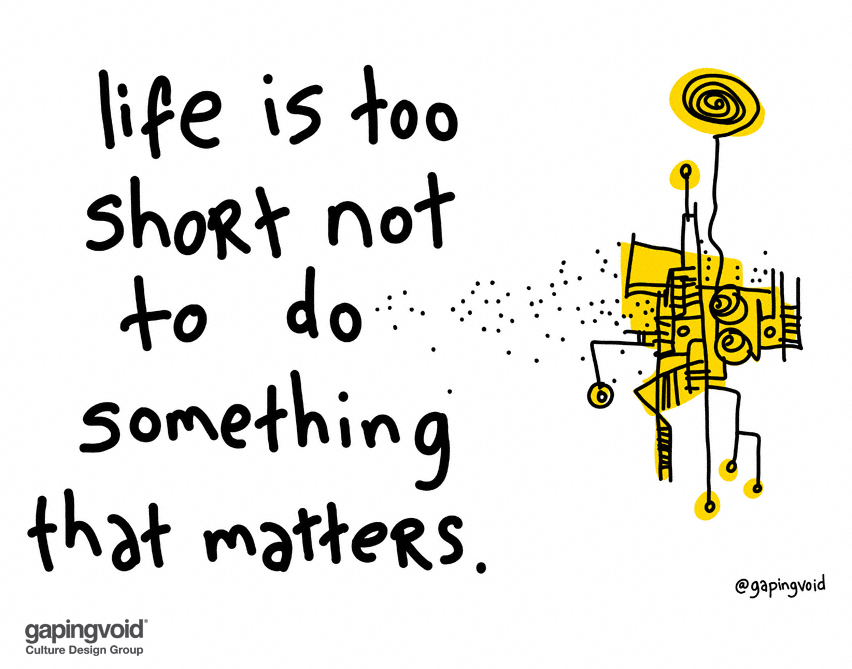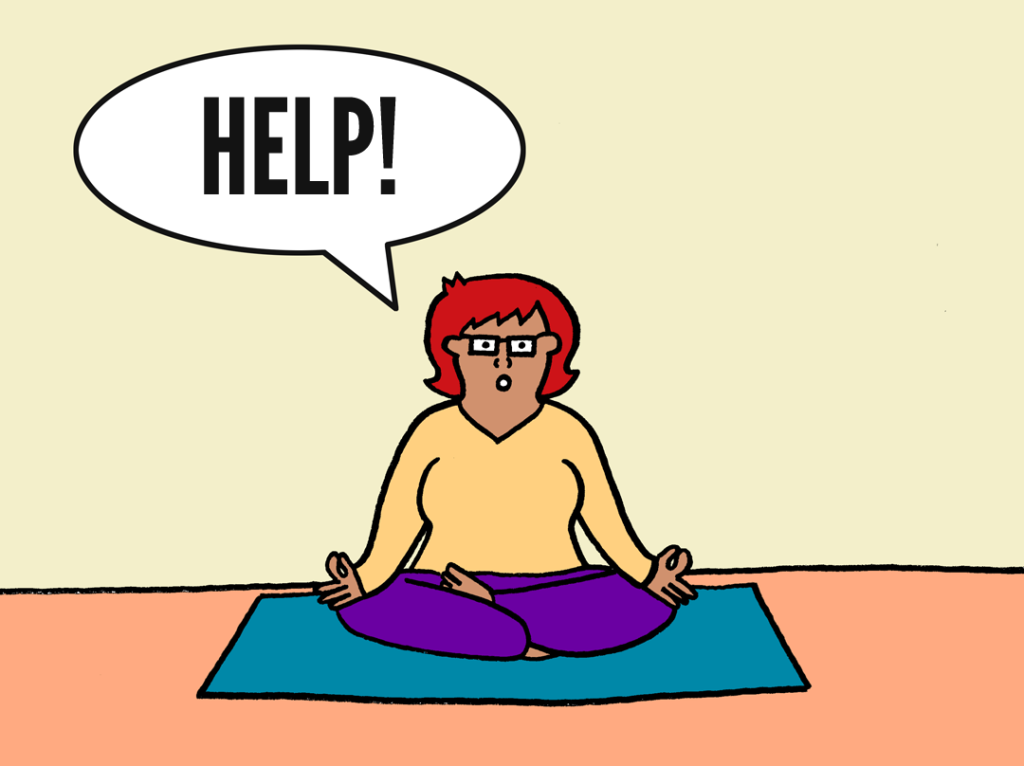Three Ways to Breathe Life Into Your Most Passionate Creative Venture

If you are on the cusp of a new venture that fills you with both excitement and doubt, welcome to the human race.
Most aspiring innovators on the brink of a breakthrough assume they need to be in a doubt-free state if they are going to succeed and that anything less is a sure sign that they are either imposters, fools or losers-in-waiting.
Not true.
The experience of doubt (and it's twin cousins, fear and dread) comes with the territory of starting a new venture. What's needed, wrote Rollo May in his extraordinary book on the topic, is courage -- the courage to create.
How will you develop the courage YOU need? In many ways.
One way to begin is to be encouraged and that, precisely, is what the following three links will help you experience.

Clarify Your Vision
Frame Your Real Question
Make More Time to Create
NOTE: After you complete any or all of the above self-inquiry pages, you have three choices: 1) You can click "submit", which will enable the creator of these pages to read your response (and maybe reply); 2) You can save what you wrote as a PDF for later reflection. 3) You can do both.
Illustration #1: Samuel Zeller, Unsplash
Illustration #2: gapingvoid
Posted by Mitch Ditkoff at 04:45 PM | Comments (0)
Happy Valentine's Day to You!Here is an inspiring Valentine's Day slide show for you. Includes 21 wonderful quotes on love and vocals by Daya Rawat.
Posted by Mitch Ditkoff at 12:27 AM | Comments (0)
Happy Valentine's Day to You!Here is an inspiring Valentine's Day slide show for you. Includes 21 wonderful quotes on love and vocals by Daya Rawat.
Posted by Mitch Ditkoff at 12:25 AM | Comments (0)
February 05, 2023How to Ask for the Help You Need

"You can do anything, but not everything." -- David Allen
Two years ago, I designed and facilitated an online course to help people transform their inspired ideas, inspirations, and ventures into reality. It was ton of fun and very fulfilling -- my "calling", if you will (and even if you won't).
Baked into the learning process were simple ways to help participants become aware of the places inside themselves where they were tangled or challenged in their approach.
One tangle that surprised me was how difficult it is for most people to ask for help.
While it is true that the creative process requires a healthy dose of solitude, it also requires a healthy dose of interaction with others and occasionally the well-timed support of others.
Indeed, there are times when even the most self-sufficient and confident person needs a push, pull, jiggle, jolt, feedback, encouragement, or hug.
Even though, most people intellectually acknowledge this need, most of us tend to default to the "I'm-in-this-all-alone" mode.

I've been pondering this phenomenon for the past few months, trying my best to better understand it. Here's what I've come up with:
Ten Common Reasons Why Most of Us Don't Ask for Help:
1. We assume that the people we want to ask for help are too busy.
2. We're unclear about the specific help we need.
3. We don't know who to ask for help.
4. We anticipate discomfort if our request for help is "rejected."
5. We don't believe we deserve anyone's help.
6. We think that asking for help is a sign of weakness.
7. We don't want to be "beholding" to anyone (i.e. if the person who agrees to our request turns around and ask us for help.)
8. We are afraid of strong personalities challenging our approach.
9. We are afraid of success.
10. We are afraid that our finished product won't be as incredible as we imagine it will be, so we subvert its completion by not asking for help.
So there you have it -- ten Big Bad Wolves that may have taken up residence in your head -- funky, old habits that compromise your ability to ask for help.
Please know there are many ways to go over, under, around, and through these obstacles. For starters, consider some of the following options. Then choose at least one of them to get the party started:

The Idiot Savant's Guide to Getting the Help You Need
1. Make a list of everything you don't know about your project.
2. Make a list of the kind of help you need. Be specific!
3. Make a list of everyone whose help you'd like.
4. Identify your preferred ways of asking for help, i.e. email, phone call, Zoom call, breakfast, lunch, dinner, drinks, walk, etc.
5. Identify what you can you barter in exchange for the help you are seeking, so it's not always a one-way transaction.
6. Think about who asked YOU for help in the past? How did you respond?
7. List your biggest limiting assumptions about asking for help.
8. Transform each of your limiting assumptions into a question, beginning with the words "How can I?" For example, if one of your beliefs is "Everyone I know is too busy to help me," change that assumption into a question, i.e. "How can I find out if the people I know are too busy to help me?"
9. Close your eyes and imagine that you had all the support you needed. How does that feel?
10. Sometimes, the hardest part of asking for help, is the opening line -- a way to break the ice. Towards that end, here are some conversation starters for you to consider:
-- "I'm not sure if you know this, but I'm immersed in a very meaningful project. The deeper I get into it, the more I realize that I need some support. I wonder if you'd be willing to (specific request here). I'm guessing this will take you about 20 minutes per week."
-- "Committed to (insert project name here), I'm in the process of putting together a team of talented people to provide support. I wonder if you're be available to be part of my team. Here's the specific support I'm asking you for (insert request here)."
-- "I have so much respect for your ability to (insert ability here). This, as you may know, is not one of my strengths. Would you be open, from time to time, to provide some input, coaching, or support in this arena?"
-- "Recently, I've run into some challenges with my project (insert specific challenge here). From what I can tell, you have already mastered this domain. Would you be willing to assist me?"
-- "Are you available, once a week, to meet with me and share your ideas and insights about my project?"
"Ask and ye shall receive."
The project I'm reaching out to friends for support
Posted by Mitch Ditkoff at 08:22 AM | Comments (0)
February 03, 2023100 Reasons Why You Don't Get Your Best Ideas At Work

Since 1987, I've asked 2,500 people where and when they get their best ideas. Less than 2% have said "the workplace."
Based on my 33 years of working with a ton of innovation-seeking organizations, here's my take on WHY you don't get your best ideas at work:
1. Too much to do, not enough time.
2. Too many distractions and interruptions.
3. You work in a risk averse organization.
4. Sleep deprivation.
5. Mental clutter.
6. Fear that someone will steal your idea.
7. You don't think of yourself as creative.
8. Boring meetings that put you in a bad mood.
9. You're not measured for the quantity or quality of ideas you generate.
10. Stultifying routine.
11. You are worried about layoffs and don't want to draw undue attention to yourself.
12. Poor ventilation -- not enough oxygen.
13. The last time you came up with a great idea, you were either ignored or ridiculed.

14. It's not in your job description.
15. It's not in the strategic plan.
16. It's not in the cards.
17. It's not in your favorite holy book
18. Your manager has made it clear that he/she does not have the time to consider your ideas.
19. Lack of immersion. Lack of incubation.
20. No one's ever told you that they want your ideas.
21. You are understaffed and don't have the time to try an innovative approach.
22. You are angry at the company.
23. You get no input from people outside your department.
24. Your company has just been acquired and you don't want your new overlord to succeed.
25. You know there's no one to pitch your new ideas to -- and even if there was, it's a long shot they would listen.
26. You're concerned that your great idea is so great that it will actually be accepted and then you will be expected to work on it in your spare time (which you don't have) with no extra resources made available to you.
27. All your great ideas are focused on trying to get Gina or Gary, in Marketing, to give you the time of day.
28. You're a new parent.
29. You've got other projects, outside of work, and have no energy left to think about anything else.

30. They don't pay you enough to think creatively.
31. You're expected to leave your mind at the door when you come to work.
32. No incentives or rewards.
33. You don't have the intrinsic motivation .
34. Actually, you don't want to be working at all -- and you wouldn't be working if you didn't have to.
35. You have not identified a challenge or opportunity that inspires you enough to think up new ideas.
36. No timely feedback from others.
37. There's no one to collaborate with.
38. Constantly changing priorities.
39. "Work," for you is synonymous with things you have to do not want to do, thus creating two parallel universes that never intersect.
40. You haven't read my award winning book yet.
41. It's too noisy.
42. Endless hustle and bustle.
43. You can't stop thinking about Covid-19.
44. You're too busy tweeting.
45. You have the attention span of a tse-tse fly.
46. Just when a good idea pops into your head, you dismiss it as "not good enough".
47. Your left brain has become a kind of Attila the Hun in relation to your Pee Wee Herman-like right brain.
48. You didn't get the memo.
49. You are too busy deleting spam.
50. The brainstorming sessions you attend are pitiful.
51. You believe that new ideas are a dime a dozen.
52. You're not paid to think. You're paid to DO.
53. Actually, you don't have a job.
54. You are hypoglycemic.
55. You're not allowed to listen to music at your desk.

56. You have no sense of urgency.
57. Your office or cubicle feels like a jail cell.
58. You're too busy filling out forms.
59. Not enough coffee.
60. You don't like your boss.
61. Existential despair.
62. There's a call on Line 2.
63. You have no time to incubate or reflect.
64. You've got to show results fast.
65. You know your manager will, eventually, get all the credit for your great ideas.
66. You've just been assigned to another project.
67. Brain fatigue.
68. You haven't tried Free the Genie yet.
69. You don't feel valued or appreciated.
70. You deciphered a much talked about sighting of a Crop Circle in England as meaning: "Stop coming up with good ideas at work."
71. Every extra minute you have is spent on Facebook.
72. There's too much stress and pressure on the job.
73. Naysayers and idea killers surround you.
74. Inability to relax.
75. It's summertime.
76. You've got this weird rash on your leg and you think it might be Lyme's disease or leprosy.
77. What you think of as a great idea and what your manager thinks of as a great idea are two entirely different things.
78. You know you won't get the funding, so why bother?
79. You're just trying to get through the day.
80. Every time you get a great idea, it's time to go to another meeting.
81. You only get your great ideas in the shower and there are no showers at work.
82. Your head is filled with a thousand things you need to do.
83. Relentless deadlines.
84. Too much input from others.
85. You have to stay focused on the "job at hand".
86. You'll only end up making the company richer and that is not what you want to do.
87. Those bright, annoying, overhead fluorescent lights.
88. No one besides you really cares.
89. You've just been assigned a project that is totally boring.
90. There is no one to brainstorm with.
91. Your husband/wife is complaining that all you ever do is work -- or talk about work.
92. You have the wrong astrological sign.
93. Your cultural upbringing has taught you that it is not your place to conjure up new ideas.
94. Your job is too structured to think outside the box.
95. People seem to be staring at you and that makes you self-conscious.
96. You're too busy.
97. Wait! How come they're taking so much out of your paycheck?
98. You're only working there to beef up your resume for the next job.
99. A vast right wing conspiracy.
100. You end up reading long lists like this which eats into whatever time you have to come up with good ideas.
A big thank you to Jim Aubele, Fran Tyson-Marchino, Nirit Sharon, Cindy Pearce, Robert Fischaleck, Deborah Medenbach, Amy de Boinville, Glenna Dumay, Bert Dromedary, and Sally Kaiser for their contributions to this list.
A good way to get ideas at work
Idea Champions
A virtual way to get new ideas
Our no BS creative thinking training
Posted by Mitch Ditkoff at 11:29 AM | Comments (5)














